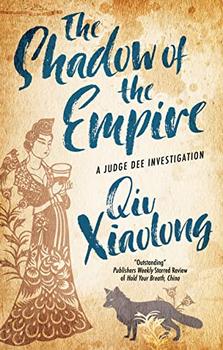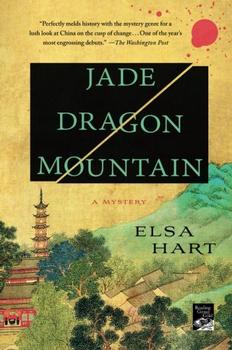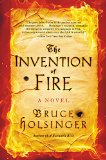Summary | Excerpt | Reviews | Beyond the book | Read-Alikes | Genres & Themes | Author Bio

A Judge Dee Investigation #1
by Qiu XiaolongThe legendary Judge Dee Renjie investigates a high-profile murder case in this intriguing companion novel to Inspector Chen and the Private Kitchen Murder set in seventh-century China.
Judge Dee Renjie, Empress Wu's newly appointed Imperial Circuit Supervisor for the Tang Empire, is visiting provinces surrounding the grand capital of Chang'an. One night a knife is thrown through his window with a cryptic note attached: 'A high-flying dragon will have something to regret!'
Minutes after the ominous warning appears, Judge Dee is approached by an emissary of Internal Minister Wu, Empress Wu's nephew. Minister Wu wants Judge Dee to investigate a high-profile murder supposedly committed by the well-known poetess and courtesan, Xuanji, who locals believe is possessed by the spirit of a black fox.
Why is Minister Wu interested in Xuanji? Despite Xuanji confessing to the murder, is there more to the case than first appears? With the mysterious warning and a fierce power struggle playing out at the imperial court, Judge Dee knows he must tread carefully...
While the author's descriptions of temples, scrolls and woodblock printing are fascinating, I yearned for more sensory details about food, drink, art and fashions of the day. The action can be weighed down with long passages of dialogue between characters, which sometimes slows dramatic tension. Nevertheless, I quite enjoyed reading a novel where messages are delivered at the tip of an arrow, or are coded into poems handwritten with ink and pen. Travel in those times was by foot, carriage, or on horseback, and I was happy to slow down and savor an intricate mystery on a rainy day sitting by the fire...continued
Full Review
(726 words)
This review is available to non-members for a limited time. For full access,
become a member today.
(Reviewed by Karen Lewis).
 Chinese poetry has a long and varied history. The Tang Dynasty (from 618-907) is considered one of the most vibrant cultural periods for poetry and other arts.
Chinese poetry has a long and varied history. The Tang Dynasty (from 618-907) is considered one of the most vibrant cultural periods for poetry and other arts.
In Qui Xiaolong's mystery novel The Shadow of the Empire, set during the Tang Dynasty, detective Judge Dee professes to be a poet, and much of the plot is driven by clues held in poems. Judge Dee's investigation revolves around Yu Xuanji (pronounced "Yoo Shan-chee"), a real-life poet and courtesan.
Fortunately for today's readers, many poems from the era have survived the centuries and been widely translated. The Chinese tradition of writing poems in ink either on paper or as part of a painting scroll is one reason that ancient poetry survives. Woodblock printing was invented ...
This "beyond the book" feature is available to non-members for a limited time. Join today for full access.

If you liked The Shadow of the Empire, try these:

by Elsa Hart
Published 2016
On the mountainous border of China and Tibet in 1708, a detective must learn what a killer already knows: that empires rise and fall on the strength of the stories they tell.

by Bruce Holsinger
Published 2016
Fourteenth-century London comes alive in all its color and detail in this riveting thriller featuring medieval poet and fixer John Gower—a twisty tale rife with intrigue, danger mystery, and murder.